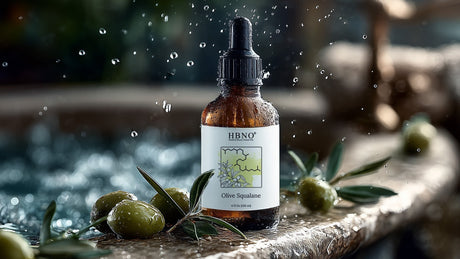Peanut butter is a popular spread known for its rich taste and creamy texture. While peanuts and oil add flavor and nutrients, the use of Palm Essential Oil raises concerns.
This article covers why Palm essential oil is used, its impact, and why manufacturers prefer it. It also explores the debate around Palm Essential Oil and how to choose the right peanut butter.
Benefits of Palm Essential Oil in Peanut Butter
Palm Essential Oil in peanut butter may have certain health benefits when consumed in moderation as part of a balanced diet. Let's explore some of these benefits:
1. Rich in Healthy Fats
Peanut butter is rich in healthy fats, including monounsaturated and polyunsaturated fats. Palm Essential Oil, with both monounsaturated and saturated fats, also contains tocotrienols a form of vitamin E. Its stability helps preserve peanut butter's quality and nutrients.
2. Magnesium
Peanut butter with Palm Essential Oil is a good source of magnesium, essential for muscle function, nerves, and energy. A 2-tablespoon serving provides about 50 mg, or 12% of the daily need, making it a valuable addition to a balanced diet.
3. Vitamin E and Antioxidants
Peanut butter with Palm Essential Oil is rich in vitamin E, providing tocopherols and tocotrienols-antioxidants that support heart health.
4. Sustained Energy
Peanut butter with Palm Essential Oil is rich in protein and fat, offering long-lasting energy. A 2-tablespoon serving provides 8 grams of protein and 16 grams of fat, helping the body absorb essential vitamins. Its calorie density makes it ideal for sustained energy and can aid in weight management when consumed in moderation.

Why Palm Essential Oil is Used in Peanut Butter
Peanut butter is made by grinding peanuts into a paste and often adding oils to improve texture and consistency. Many commercial peanut butters use Palm Essential Oil as one of their main oils, alongside or in place of other oils like soybean, sunflower seed carrier oil , or canola oil. Palm Essential Oil is commonly added for several reasons:
- Texture and Stability:Palm Essential Oil helps maintain peanut butter's creamy texture by preventing separation, as it stays solid at room temperature, keeping the spread smooth and easy to use.
- Cost-Effectiveness: Palm Essential Oil is relatively inexpensive to produce and widely available, making it an affordable ingredient for manufacturers.
- Natural Labeling: Many peanut butter brands label their product "natural" when using Palm Essential Oil as it is non-hydrogenated, unlike trans fats created during hydrogenation.
Concerns About Palm Essential Oil in Peanut Butter
While Palm Essential Oil offers some health benefits, there are concerns associated with its consumption, especially when included in processed foods like peanut butter. Let's take a closer look at some of the key issues.
1. High in Saturated Fat
Palm Essential Oil contains about 50% saturated fat, mainly palmitic acid, which has a more neutral effect on cholesterol levels compared to other saturated fats in oils like olive or canola.
2. Environmental Impact
Palm Essential Oil production is linked to deforestation, habitat destruction, and environmental issues. To address this, consumers should choose brands that use sustainably sourced Palm Essential Oil, certified by the Roundtable on Sustainable Palm Essential Oil (RSPO), which ensures adherence to environmental and social standards.
3. Additives and Preservatives
Many commercial peanut butters with Palm Essential Oil also contain added sugars, preservatives, and artificial flavors, which can reduce health benefits. Always check the ingredient list for added sugars or hydrogenated oils.
4. Moderation Is Key
Moderation is key when consuming peanut butter with Palm Essential Oil, due to its high calorie content.. A 2-tablespoon serving contains about 188 calories, and overeating can contribute to weight gain, especially with other high-calorie foods.

How to Choose the Right Palm Essential Oil for You
Choosing the right bulk Palm Essential Oil ensures quality, sustainability, and suitability for your needs. Here's what to consider:
- Look for Certifications - Choose RSPO-certified Palm Essential Oil to ensure ethical and eco-friendly sourcing.
- Check Purity - Opt for 100% pure Palm Essential Oil without additives or preservatives.
- Select the Right Type - Red Palm Essential Oil is nutrient-rich, while refined Palm Essential Oil has a neutral taste for versatile use.
- Ensure Proper Packaging - Bulk Palm Essential Oil should come in industry-standard containers to maintain freshness and stability.
- Buy from a Reliable Supplier - Choose a trusted wholesale source that prioritizes quality and sustainability.
By considering these factors, you can confidently select high-quality Palm Essential Oil in bulk for food, cosmetics, or industrial products.
Conclusion
Palm Essential Oil in peanut butter has both good and bad sides. It adds smooth texture and long shelf life, but some worry about its sourcing and fat content. Choosing brands with sustainably sourced Palm Essential Oil or alternatives like olive oil can be a better option.
Balance is key to enjoying peanut butter. If you need bulk Palm Essential Oil for business or personal use, HBNO Bulk offers high-quality, responsibly sourced options. Collaborate with skilled Private Label Specialists to develop market-ready formulations.




